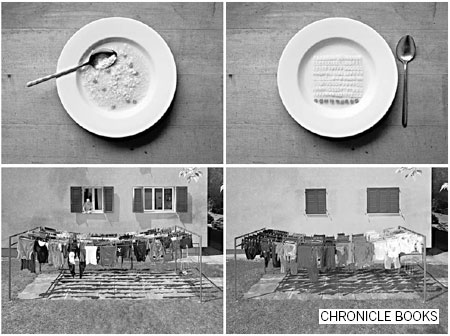Turn to tidiness elevates a star
Updated: 2013-04-07 07:45
By Penelope Green(The New York Times)
|
|||||||

|
A comedian in Switzerland, Ursus Wehrli is also known for his picture books on "tidying up." His third one is now being released in the United States. Images from the book, top. Andrea Wyner for The New York Times |
ZURICH - Ursus Wehrli is famous in his country for being half of the anarchic comic duo Ursus & Nadeschkin, but he has lately accrued another sort of fame as an author with a particularly fastidious worldview. So it may come as a bit of disappointment to certain design blog fans to learn that Mr. Wehrli is not exactly a neatnik or in any way obsessive or compulsive.
Mr. Wehrli's first two picture books, "Tidying Up Art" and its sequel, "Tidying Up More Art," present a simple but satisfying sight gag, over and over, in which he "tidies up" modern masters like Klee and Picasso, Pollock and Haring in a series of "before" and "after" photos. In the "afters," Mr. Wehrli, 44, deconstructs a painting's components (body parts, say, in a Picasso, or squares in a Klee) and then stacks them in neat, color-specific rows. Flummoxed by Pollock, he offers just cans of paint. The first "Tidy" book, published in 2002, sold half a million copies in Europe. (Last year, he was invited by the Swiss Post to tidy up a stamp.)
And out now in the United States is Mr. Wehrli's third book, "The Art of Clean Up: Life Made Neat and Tidy." More than 100,000 copies of the German edition, published in late 2011, have already sold.
Many have wondered, what does this guy's house look like? After all, his new book tackles more quotidian subjects than fine art: laundry drying on a clothesline is re-sorted by color; a bowl of sliced fruit in a polka-dot bowl is organized into its parts, polka dots included.
It turns out that Mr. Wehrli's home, a six-room duplex apartment in Zurich West, is neither particularly neat nor slovenly, occupying instead a recognizable middle ground. Bright, spare and slightly industrial, it is distinctive in the way many European homes are to American eyes: there is a lot less stuff.
A bright yellow hammock bisects the living room at its midpoint. A shaggy turquoise footstool sits on a bright orange rug like an exclamation point. There is not much artwork, either.
Mr. Wehrli, a lanky former juggler, lives with his 6-year-old son and his partner of 16 years, Brigitta Schrepfer, 46, in a cooperative apartment complex in an old industrial area that is something of a model for communal living and collaborative consumption.
Juggling was a career choice he made because it gave him autonomy. Wasn't his mother worried?
"She worried because I used to practice in the kitchen and I broke a lot of dishes," he said.
It was his mother who suggested that Mr. Wehrli attend a circus workshop in Germany 25 years ago. That's where he met Nadja Sieger. The workshop was boring and chaotic, he said, and they bonded over its failures. In the beginning, their act was mostly juggling, music and unicycling.
He met Ms. Schrepfer, a dancer, when he and Ms. Sieger traveled to New York in the late '90s to perform at an arts center and he rented a room in an apartment that Ms. Schrepfer had once rented. He was already "a little bit in love," he said, when he brought back a bag of clothing she had left behind in New York. Unbeknown to him, "I meant to leave it behind," Ms. Schrepfer said. "So I threw the bag in the trash the moment he handed it to me."
The complex where they have lived since 2001 is not architecturally marvelous, but its social and environmental workings make it lovely. Residents collaborate on maintenance projects, group dinners, film nights and a video library. Residents pay a "spirit fee" of 10 to 60 francs, or $10 to $60, a month, which goes to supporting low-income tenants and environmental projects like composting.
In his living room, Mr. Wehrli mused on cultural stereotypes, like the orderliness of the Swiss.
"We live in a small country, much of which is covered in mountain ranges," he said. "We constantly have to find ways around those mountains. We have to arrange all the time. You learn immediately you have to arrange with others; you have to have rules. You don't have many arrogant Swiss people: the grossenwahn, the big person who thinks too much of himself. We don't have stars, in sports or music or art, except Roger Federer and he is very shy."
Yet it could be argued that Mr. Wehrli and Ms. Sieger are stars. The pair have won nearly every major theater award their country gives out, and a few outside of it. He performs about 100 sold-out shows each year.
As a comedian, Mr. Wehrli said, he is devoted to upending expectations. "Comedians take a neat situation and turn it into a mess," he said. "And in my books I do the same thing, but it's the other way around. I like to mess around with mess. A mess is only a mess because someone tells you it is."
The New York Times
(China Daily 04/07/2013 page12)
